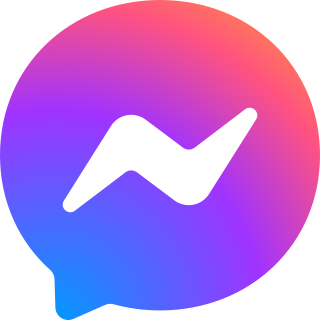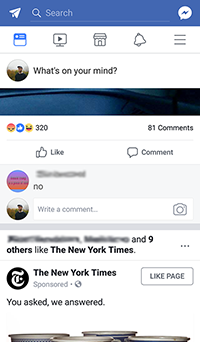
Meebo was an instant messaging and social networking service provider. It was founded in September 2005 by Sandy Jen, Seth Sternberg, and Elaine Wherry, and was based in Mountain View, California. Initially the company offered a web-based instant messenger service, extending its offer in more general online chat and even social networking directions. In June 2012, Google acquired Meebo to merge the company's staff with the Google+ developers team.

Facebook is an online social media and social networking service owned by American technology giant Meta Platforms. Created in 2004 by Mark Zuckerberg with four other Harvard College students and roommates Eduardo Saverin, Andrew McCollum, Dustin Moskovitz, and Chris Hughes, its name derives from the face book directories often given to American university students. Membership was initially limited to Harvard students, gradually expanding to other North American universities. Since 2006, Facebook allows everyone to register from 13 years old, except in the case of a handful of nations, where the age limit is 14 years. As of December 2022, Facebook claimed 3 billion monthly active users. As of October 2023 Facebook ranked as the 3rd most visited website in the world with 22.56% of its traffic coming from the United States. It was the most downloaded mobile app of the 2010s.

hi5 is an American social networking service based in San Francisco, California. It is owned by The Meet Group.

Tagged is a social discovery website based in San Francisco, California, founded in 2004. It allows members to browse the profiles of any other members, and share tags and virtual gifts. Tagged claims it has 300 million members as of 2014. As of September 2011, Quantcast estimates Tagged monthly unique users at 5.9 million in the United States, and 18.6 million globally. Michael Arrington wrote in April 2011 that Tagged is most notable for the ability to grow profitably during the era of Facebook.

Bebo was an American social networking website that originally operated from 2005 until its bankruptcy in 2013 and relaunched in February 2021. The site relaunched several times after its bankruptcy with a number of short-lived offerings, including instant messaging and video streaming, until its acquisition by Amazon in July 2019 when it was shut down. It was announced in January 2021 that it would be returning as a new social media site the month after. By May 2022, it had once again been shut down, without having ever left beta testing.
RockYou was a company that developed widgets for MySpace and implemented applications for various social networks and Facebook. Since 2014, it has engaged primarily in the purchases of rights to classic video games; it incorporates in-game ads and re-distributes the games.
Clicker was an Internet video directory and search company based in Los Angeles, California. Their website aimed to be the TV Guide for all full episodes of programs available to watch on the Web. It is owned by CBS Interactive.

Facebook is a social networking service originally launched as TheFacebook on February 4, 2004, before changing its name to simply Facebook in August 2005. It was founded by Mark Zuckerberg and college roommates and fellow Harvard University students, in particular Eduardo Saverin, Andrew McCollum, Dustin Moskovitz, and Chris Hughes. The website's membership was initially limited by the founders to Harvard students, but was expanded to other colleges in the Boston area, the Ivy League, and gradually most universities in the United States and Canada, corporations, and by September 2006, to everyone with a valid email address along with an age requirement of being 13 or older.

Instagram is an American photo and video sharing social networking service owned by Meta Platforms. It allows users to upload media that can be edited with filters, be organized by hashtags, and be associated with a location via geographical tagging. Posts can be shared publicly or with preapproved followers. Users can browse other users' content by tags and locations, view trending content, like photos, and follow other users to add their content to a personal feed.

BranchOut was a Facebook application designed for finding jobs, networking professionally, and recruiting employees. It was founded by Rick Marini in July 2010, and was, as of March 2012, the largest professional networking service on Facebook. The company sold its assets to HR Software Company 1-Page in November 2014 and the staff was picked up by Hearst.

Messenger is an American proprietary instant messaging app and platform developed by Meta Platforms. Originally developed as Facebook Chat in 2008, the company revamped its messaging service in 2010, released standalone iOS and Android apps in 2011, and released standalone Facebook Portal hardware for Messenger calling in 2018. In April 2015, Facebook launched a dedicated website interface, Messenger.com, and separated the messaging functionality from the main Facebook app, allowing users to use the web interface or download one of the standalone apps. In April 2020, Facebook released a Messenger desktop app for Windows and macOS.
Snapchat is an American multimedia instant messaging app and service developed by Snap Inc., originally Snapchat Inc. One of the principal features of Snapchat is that pictures and messages are usually only available for a short time before they become inaccessible to their recipients. The app has evolved from originally focusing on person-to-person photo sharing to presently featuring users' "Stories" of 24 hours of chronological content, along with "Discover", letting brands show ad-supported short-form content. It also allows users to store photos in a password-protected area called "my eyes only". It has also reportedly incorporated limited use of end-to-end encryption, with plans to broaden its use in the future.
Socialthing was a social news aggregator that founded in 2007 and was acquired by AOL the following year for an undisclosed sum. Later renamed AOL Lifestream, the service was a central part of AOL's unsuccessful attempt to compete against upstart social networks such as Facebook.
Secret was an iOS and Android app service that allowed people to share messages anonymously within their circle of friends, friends of friends, and publicly. It differs from other anonymous sharing apps such as PostSecret, Whisper, and Yik Yak in that it was intended for sharing primarily with friends, potentially making it more interesting and addictive for people reading the updates. It was founded by David Byttow, the former lead for Square Wallet, and Chrys Bader-Wechseler, a former Google product manager at Google+, Photovine and YouTube. Bader-Wechseler left the company in January 2015, with the stated reason that the company's shift away from beautiful design and towards more minimalistic design meant that he felt he was no longer the best person to be at the helm of the company. Byttow announced the shutdown of the app and the company on April 29, 2015.
Venmo is an American mobile payment service founded in 2009 and owned by PayPal since 2013. Venmo is aimed at friends and family who wish to split bills, e.g., for movies, dinner, rent, or event tickets etc. Account holders can transfer funds to others via a mobile phone app; both the sender and receiver must live in the United States. Venmo also operates as a small social network, as users can observe other users’ public transactions with posts and emoticons. In 2021, the company handled $230 billion in transactions and generated $850 million in revenue.
Snap Inc. is an American camera and social media company, founded on September 16, 2011, by Evan Spiegel, Bobby Murphy, and Reggie Brown based in Santa Monica, California. The company developed and maintains technological products and services, namely Snapchat, Spectacles, and Bitmoji. The company was named Snapchat Inc. at its inception, but it was rebranded Snap Inc. on September 24, 2016, in order to include the Spectacles product under the company name.

Facebook's Feed, formerly known as the News Feed, is a web feed feature for the social network. The feed is the primary system through which users are exposed to content posted on the network. Feed highlights information that includes profile changes, upcoming events, and birthdays, among other updates. Using a proprietary method, Facebook selects a handful of updates to show users every time they visit their feed, out of an average of 2,000 updates they can potentially receive. Over two billion people use Facebook every month, making the network's Feed the most viewed and most influential aspect of the news industry. The feature, introduced in 2006, was renamed "Feed" in 2022.

Gogobot was an online travel business headquartered in Palo Alto, California. The company was rebranded Trip.com in November 2016 and acquired by the Ctrip Group in 2017. Founded in 2010, by Travis Katz and Ori Zaltzman, by 2014 the company was the fifth most visited travel-planning site in the United States.

Arjun Sethi is an American internet entrepreneur, investor and executive. He is co-founder and partner at venture capital firm Tribe Capital. He previously was partner at Social Capital and served as an executive at Yahoo! where he launched Yahoo! Livetext. Before that, he was co-founder and CEO of MessageMe and he was CEO of Lolapps, the developer behind Ravenwood Fair.












